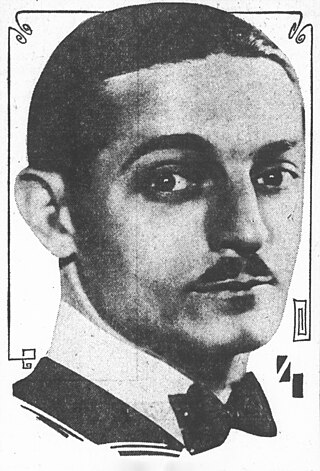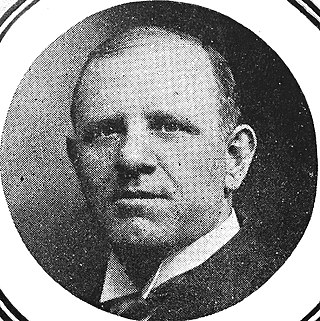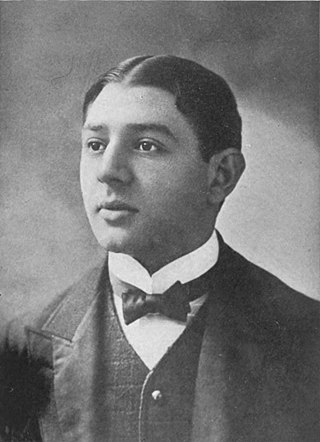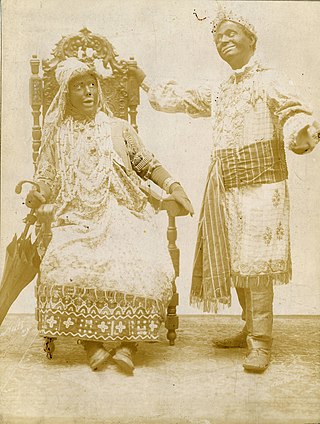
Jean Schwartz was a Hungarian-born Jewish American composer and pianist. He is best known for his work writing the scores for more than 30 Broadway musicals, and for his creation of more than 1,000 popular songs with the lyricist William Jerome. Schwartz and Jerome also performed together on the vaudeville stage in the United States; sometimes in collaboration with Maude Nugent, Jerome's wife, and the Dolly Sisters. Schwartz was married to Jenny Dolly from 1913 to 1921.

Lester M. Allen was an American actor, dancer, singer, comedian, and circus performer. After beginning his career as a child acrobat with the Barnum and Bailey Circus, he became a performer in minstrel shows, burlesque, and vaudeville. He worked as primarily a dancer and acrobat in the Broadway musical revues George White's Scandals and Ziegfeld Follies in the 1910s and early 1920s; ultimately progressing to singing and comedic acting parts. He starred as a comic actor in several musical comedies on Broadway during the 1920s and the early 1930s. He transitioned into work as a film actor, appearing in more than 15 films released from 1941 to 1950. He was killed after being struck by a motor vehicle in 1949.
John Thomas O'Donnell, better known by his stage name Hap Ward, was an American comedian, dancer, and actor who was half of the vaudeville comedy duo Ward and Vokes.

Joseph Morris Weber was an American vaudeville performer who, along with Lew Fields, formed the comedy double-act of Weber and Fields.

The Casino Theatre was a Broadway theatre located at 1404 Broadway and West 39th Street in New York City. Built in 1882, it was a leading presenter of mostly musicals and operettas until it closed in 1930.

Nathaniel D. Mann (1866–1915) was an American composer best known for his work with L. Frank Baum. He composed at least two songs with Baum, "Different Ways of Making Love" and "It Happens Ev'ry Day," and another with John Slavin, "She Didn't Really Mind the Thing at All," for The Wizard of Oz stage musical in 1902, and in 1908, composed the first original film score for The Fairylogue and Radio-Plays, one of the earliest feature-length fiction films, which debuted September 24, 1908. With Baum, he also composed the musical The King of Gee-Whiz, which went through various titles such as Montezuma, King Jonah XIII, and The Son of the Sun (1905). This was collaboration with and based on a novel by Emerson Hough, which was never completed and the extant scenario published in 1969.

Norma Whalley was an Australian theatre and film actress active in the United States and Britain.

Frederick E. Hylands was an American pianist, composer and publisher active from 1887 to 1913.

Mary Arnaud "May" Naudain was an American musical theatre actress and singer.

The Rogers Brothers was a comedy double-act consisting of brothers Gus Rogers (1869–1908) and Max Rogers (1873–1932). The duo toured widely in vaudeville circuits in the United States from 1885 until Gus's death in 1908. They also starred in several Broadway musicals; most of which were created for them by the playwright John J. McNally.
Harry Delf was an American comedian, stage actor, playwright, both a screen writer and director of short films, theatrical producer, and lyricist and composer for musicals. He is best remembered as the author of the play The Family Upstairs (1925) which has been staged on Broadway twice and adapted into a film multiple times. As a comedian and stage actor he performed in vaudeville and on Broadway.

Louis Harrison was an actor, playwright, comedian, lyricist, librettist, and theatre director. As both a performer and playwright, he was mainly active within the genres of musical theatre and light opera.
Otis C. Sheridan was an American character actor who had a five decade long career on the stage from the 1890s into the early 1940s. He made his Broadway debut in 1901 as Ludwig Dollar in Thomas Q. Seabrooke's revival of the musical The Rounders. He appeared in several more Broadway musicals and plays into the late 1930s, and was also active in regional theatre until his retirement from the stage in 1941. In addition to a career in the theater, he appeared in the films The Night Angel (1931) and Sweet Surrender (1935).
The Floor Walkers was a road musical that was created as a starring vehicle for the comedy duo of Hap Ward and Harry Vokes to feature their signature roles of the tramps Lord Percy Harden and Lord Harold Poorly ; characters the duo had previously portrayed in the earlier musicals A Run On the Bank (1895) and The Governors (1898). The Floor Walkers had no attributed author for its book or lyrics, but the music for the production was created by composer Herbert Dillea who also served as the musical's music director. The most well known song from the show was "Absence Makes the Heart Grow Fonder"; which was the only song to have an attributed lyricist, Arthur Gillespie. This song was for a time a popular standard and was recorded multiple times by singer Harry Macdonough and cornetist Jules Levy for records made for the Victor Talking Machine Company and Columbia Records from 1902 through 1905, and later was recorded by Wayne King in 1947.
Daniel J. Quinlan, born Daniel Cullinan and known on the stage as Dan Quinlan, was an American actor and vaudeville and minstrel show performer. He had an active career on the American stage from 1883 until his retirement in 1932. He began his career in minstrel shows and then transitioned into vaudeville where he performed as one half of the duo Quinlan & Mack from 1905-1910. In his latter career he worked in legitimate theatre; starring in several Broadway musicals in the 1910s and 1920s.

The Ham Tree is a "musical vaudeville" in three acts with music by Jean Schwartz, lyrics by William Jerome, and a book by George V. Hobart. A popular success from its debut in 1905, the work toured for several years; including three separate runs on Broadway. The work was created as a starring vehicle for vaudeville and minstrel show stars James McIntyre and Thomas Heath who were known for their work as blackface performers. The work incorporated several of their prior popular routines and sketches from their work on the vaudeville stage in order to appeal to their fan base. The concept of a "ham tree", along with other humorous trees like an "egg tree", was a repeating gag in their works dating back to their performances in The Georgia Minstrels in the 1890s and early 1900s. Following its initial tour, the work was revived by McIntyre and Heath several times, and was later heavily revised and retitled Hello, Alexander for a Broadway staging in 1919.

Mother Goose is a musical in three acts with music by Frederick Solomon, lyrics by George V. Hobart, and a book by John J. McNally that was adapted from Arthur Collins and J. Hickory Wood's libretto for the 1902 pantomime of the same name. The work's plot pulled loosely from several fairy tales and nursery rhymes, including Mother Goose and Jack and Jill. The work also contained many songs interpolated into the production by other writers, including two songs by George M. Cohan: "Rube" and "Always Leave Them Laughing When You Say Goodbye".
Thomas Mayo Geary was an American songwriter, composer, vaudeville performer, and music publishing executive. He formed a partnership with fellow Brooklyn native Harry Breen with whom he performed on the vaudeville stage in the late 1890s and early 1900s. Simultaneously, the pair worked as a song writing team with recordings of their tunes being made for the Victor Talking Machine Company and Columbia Records during the early years of the 20th century. These works are catalogued in the Discography of American Historical Recordings. Later Geary wrote songs with other lyricists, and notably wrote his own lyrics to the successful 1904 tune "The Man with the Ladder and the Hose" which honored the men of the New York City Fire Department. He worked as an executive for a variety of music publishing companies, first in New York City and later in Chicago.

Ella Snyder was an American actress. She was active in theaters in London and New York City and on the American vaudeville circuit during the 1890s and 1900s. She was known for her appearances in musicals on the West End and Broadway.
Melville Collins was an American musical theatre actor, baritone in light operas, composer, and pianist. After beginning his stage career as a baritone with the The Bostonians, he made his Broadway debut in 1900 as Louis XI in the original cast of Julian Edwards and Kirke La Shelle's operetta The Princess Chic. He then starred as Ned Royster in the 1902-1903 national tour of Reginald de Koven's Foxy Quiller and as Wakeful M. Jones in the 1903-1904 tour of Alfred G. Wathall and George Ade's The Sultan of Sulu.













